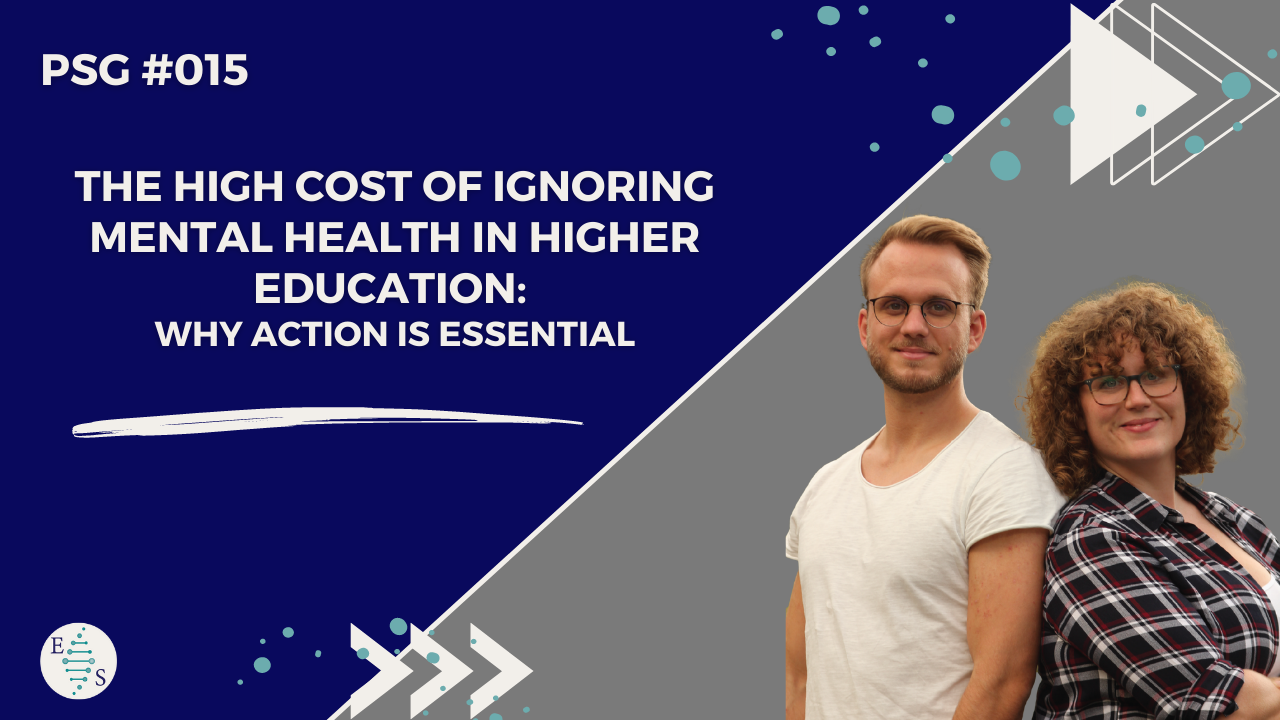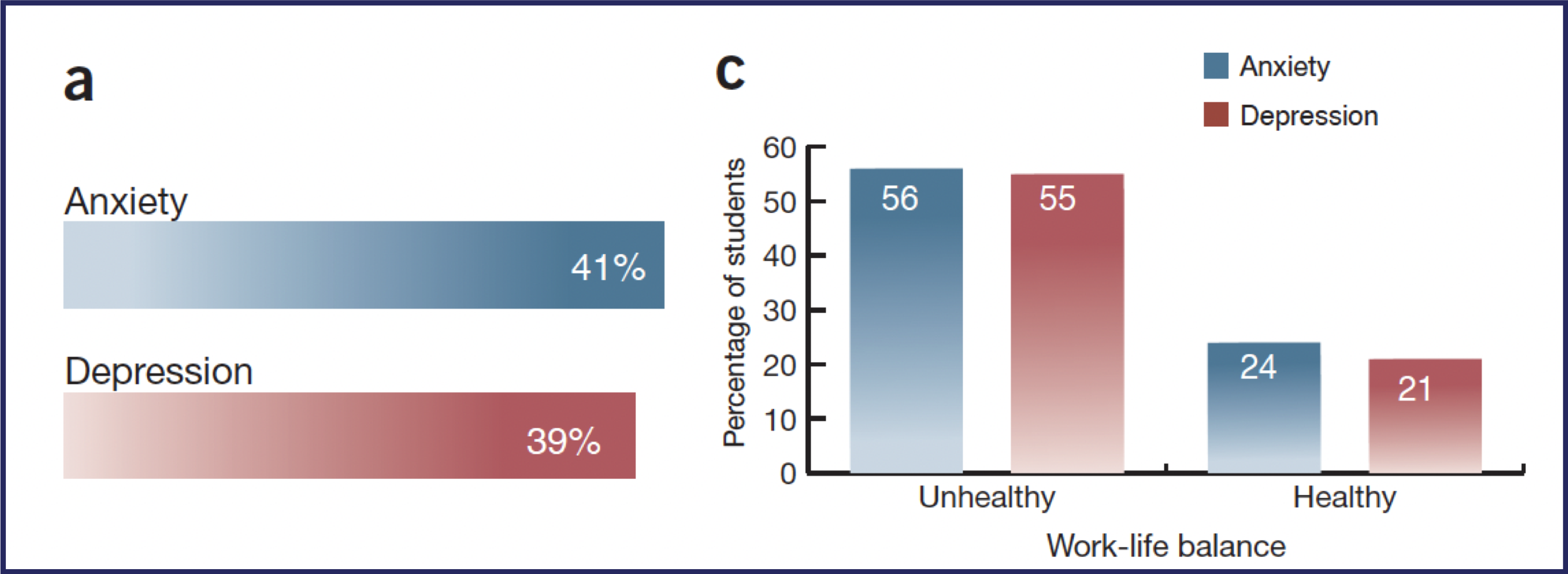
PSG #015: The High Cost of Ignoring Mental Health in Higher Education: Why Action is Essential
Aug 06, 2023Ignoring mental health issues in higher education can come at a high cost. As the mental health crisis continues to grow, it's essential that action takes place to address the problem.
Mental health issues are widespread in academic settings, affecting PhD candidates, students, faculty, and staff.
The consequences of ignoring these issues are severe. They range from decreased academic performance to increased risk of suicide.
In the end, addressing mental health issues is not only essential for academic success but also for the general well-being of the PhD candidates and Postdocs.
1. The Growing Mental Health Crisis in Higher Education
We cannot neglect the pressing issue of the growing mental health crisis in higher education.
According to a study by Nature Biotechnology, around 40% of graduate students reported experiencing depression or anxiety. This is six times more than in the general public. An unhealthy work-life balance is part of the problem:

Evidence for a mental health crisis in graduate education, Nature biotech 2018
The consequences of ignoring mental health issues are dire, not only for the individual PhD candidates but also for the entire university community.
2. The Reasons Behind It
The reasons behind the growing mental health crisis in higher education are complex and multifaceted.
One major factor is the intense pressure placed on PhD candidates to succeed academically, often at the expense of their mental and emotional well-being.
Other reasons are for example financial stress, no work-life balance, and the glorification of overworking.
Additionally, the stigma surrounding mental health issues can prevent students from seeking help when they need it, exacerbating the problem.
Furthermore, the COVID-19 pandemic has only heightened the mental health challenges faced by PhD candidates, with many experiencing isolation, uncertainty, and grief. Ignoring these issues can have serious consequences, including increased risk of suicide, decreased academic performance, and decreased general quality of life.
3. The Consequences of Ignoring Mental Health Issues
Ignoring mental health issues in higher education can have severe consequences.
How stress affects your health
Stress can be brief, situational, and a positive force motivating performance, but if experienced over an extended period of time it can become chronic stress, which negatively impacts health and well-being.
A natural reaction:
- flooding the body with stress hormones such as adrenaline and cortisol
- that elevate your heart rate,
- increase your blood pressure,
- boost your energy,
- and prepare you to deal with the problem.
Even short-lived, minor stress can have an impact. For example, you might get a stomach ache before you have to give a presentation.
Chronic stress
When stress starts interfering with your ability to live a normal life for an extended period, it becomes even more dangerous.
The long-term activation of the stress response system and the overexposure to cortisol and other stress hormones that come with it can disrupt almost all your body's processes. This can put you at increased risk for a variety of physical and mental health problems, including:
- anxiety and depression,
- digestive issues,
- headaches,
- muscle tension and pain,
- heart disease, heart attack, high blood pressure and stroke,
- sleep problems,
- weight gain,
- and memory and concentration impairment. (https://www.apa.org/topics/stress/health)
Additionally, untreated mental health issues can lead to social isolation, substance abuse, and even suicide. The cost of ignoring mental health issues is not only financial, but it can also have a lasting impact on the individual's well-being and future success.
4. Challenges to Implementing Mental Health Initiatives
Implementing mental health initiatives in academia can be a challenging task. One of the biggest obstacles is the lack of resources and funding combined with the lack of awareness.
Without adequate funding, it can be difficult to establish and maintain these programs.
Another challenge is the stigma surrounding mental health. Many people still view mental health issues as a weakness or a personal flaw, which can make it difficult to get support from others. This stigma can also make it hard for individuals to seek help when they need it. (Please ask for help when you do need it!!)
Additionally, there may be resistance from some members of the academic community who do not see mental health as a priority.
5. What Can Be Done to Address the Problem?
So, what can be done to address the problem?
Sooner than later, universities need to focus on mental health by investing in resources and support services.
They need to provide PhD candidates and Postdocs with the resources they need to thrive.
This includes increasing access to:
- courses and workshops for prevention
- coaching and counseling services,
- promoting mental health awareness,
- and creating a supportive campus culture.
Additionally, universities should work towards creating a culture that encourages open communication about mental health and reduces the stigma surrounding it.
Addressing mental health issues is vital for a healthy college environment and sets PhD candidates and Postdocs up for success in their future endeavors.
It's time for universities to take action and focus on the mental health of their PhD candidates and Postdocs.
PhD candidates and Postdocs can also do something for themselves:
Educating yourself about stress levels can not only make you feel better right now but may also protect your health long-term.
Other strategies for reducing stress include:
- Identify what’s causing stress and try to change it
- Build strong relationships
- Walk away when you’re angry
- Exercise regularly
- Rest your mind. Try meditation.
- Take breaks and holidays to relax
- Get help
6. Benefits of Focusing on Mental Health in Academia
Focusing on mental health in academia can bring countless benefits to PhD candidates, students, staff, and the institution as a whole.
Firstly, prioritizing mental health can lead to a healthier and happier academic community, which in turn can improve academic performance and productivity.
Additionally, supporting mental health can reduce the stigma surrounding mental illness and promote a more inclusive environment.
By providing resources and support for mental health, students and staff can feel more comfortable seeking help and addressing their needs. This can also lead to increased retention rates and a more positive campus culture.
Furthermore, prioritizing mental health can have long-term benefits for individuals and society, including reducing the economic burden of mental illness and improving general well-being.
7. How PhD candidates Can Take Action
As PhD candidates, you have a crucial role to play in addressing the mental health crisis in higher education.
You can take action by advocating for better mental health resources on campus, organizing events and initiatives that promote mental wellness, and supporting our peers who may be struggling.
You can also push for policy changes at the institutional level, such as increased funding for mental health services and more comprehensive mental health education for students and faculty.
Let's work together to break the stigma surrounding mental health and focus on the well-being of ourselves and our peers.
8. Conclusion: Addressing Mental Health Issues is Vital for a Healthy College Environment
In conclusion, prioritizing mental health in academia is crucial for PhD candidates', Postodcs’, and faculty's well-being and success.
It is important that universities take action to support their PhD candidates' mental health, whether through increased funding for coaching and counseling services or by implementing policies that promote mental wellness
Yet, PhD candidates can take action as well!
Use your power and:
- Take action by sharing this newsletter with all your friends and colleagues
- Contact us if you want to talk about your situation
- Contact your coordinators and tell them you need and want help
- Have the gut to tell your PI about it
- Help us to connect with your coordinator so we can help your whole group
See you next week!
PhD survival guide is a free newsletter. Please support by sharing with those who may benefit from this post.
If you want more help:
We're excited to share the PhD Survival System with you because we know how tough it can be to get through a PhD program. We have developed a holistic system combining all the necessary areas to obtain optimal results.
We start with the foundation, your mindset and on top of that we building two pillars with time management and stress management.
More about the PhD Survival System here:
Stay connected!
Join our newsletter to receive the latest posts!
Don't worry, your information will not be shared.
We hate SPAM. We will never sell your information, for any reason.